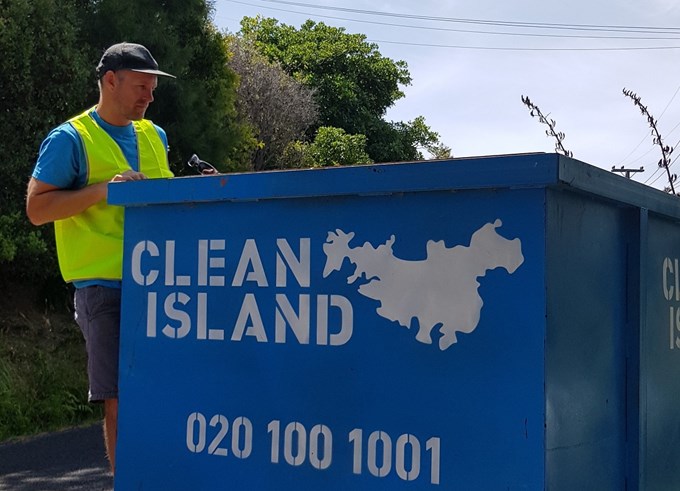When Waiheke resident Jeremy O’Hanlon took over The Rubbish Company, he noticed a big problem with the amount of construction waste heading to landfill.
With a strong desire to make a difference to the amount of landfill waste the island generates, he set about making a change – and with the help of a Waste Minimisation and Innovation Fund (WMIF) grant, the 10 Ton Project was formed.
“A massive percentage of waste on Waiheke is from building sites and we were sick of being part of the problem”, says O’Hanlon.
“We are a skip bin company, so handle a lot of construction waste. We looked at the volumes we were picking up and it was hard to watch over 150 tonnes a month, most of which could be recycled, going to landfill.”
Around 80 per cent of waste generated in the Auckland region comes from the commercial sector. The construction and demolition industry are significant contributors, making up around 50 per cent of Auckland’s waste that is currently sent to landfill.
“The only other option on the island was the transfer station and they don't recycle construction waste. That is why we started the 10 Ton Project – our aim is to divert 10 tonnes per week of construction waste from Waiheke Island that is currently going to landfill,” he says.
“It’s a tricky undertaking given we are on an island. There is only one transfer station on Waiheke and they essentially mix all of the construction materials and kerbside collection rubbish together and put it into hook bins and send it off the island twice a day to the landfill in Auckland."
To get the project off the ground, O’Hanlon says Clean Island (formerly the Rubbish Company) needed to set up a private tip pad at a yard, they needed a weighbridge, a couple of hook bins, a digger, and a concrete pad.
Clean Island Ltd was awarded $49,600 from WMIF to put towards the purchase of the equipment required.
“It was hugely helpful to receive the WMIF grant – it would have been a real stretch for our business to get into this."
"It was a big investment to bring a truck over from the UK, to find a trailer and to buy hook bins on top of that, and then buy the digger, which are essential ingredients to the whole project.”
“It would have been a capital outlay that was very risky for a project that is not tried and true, so WMIF was absolutely essential to giving us the steam to do it,” he explains.
While it is early days, O’Hanlon says it is a chance to make a change on an Island that wants it.
“It is an opportunity to do some good stuff so it’s worth investing into and ploughing ahead despite the hurdles.”
He says the focus is on construction waste. When a bin from a construction site is collected, they sort through the waste and split it into what can be reused and what needs to be sent off the island for recycling.
“We know construction waste bins are ripe for reusing and recycling and we move them to the yard to get sorted so we can divert as much as possible from landfill.”
“We work with Green Gorilla who have a sorting plant in Onehunga. We don’t have the infrastructure to manage sorting and end uses for the recovered material.”
Currently, Clean Island sends more off the island than O’Hanlon would like to, and he says once the project starts reaching the milestones, he is eager to expand into more local reuse.
“We are really keen to work with the community to increase reuse on the island – there’s some great timber that comes in the tip bins.
“We are experimenting with sorting it more ourselves on the island, sorting the metal and the wood versus just packing it all in as tight as we can and letting them sort it in Onehunga. Right now, we basically move it over and Green Gorilla get it used again.
“It’s all very positive and exciting but as with anything new, you’ve got to embrace the hurdles and keep pushing on.”
Have you got a great ‘zero waste’ idea?
If you represent a business, local iwi, or an education or community group with a project that will help reduce the amount of waste sent to landfill, you could be eligible to apply.
Visit the WMIF application page, email Auckland Waste Fund, or call 09 301 0101 to find out more.


